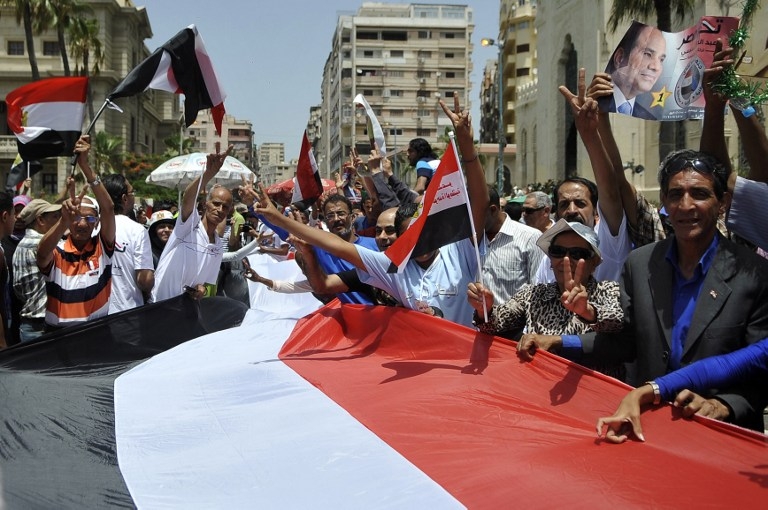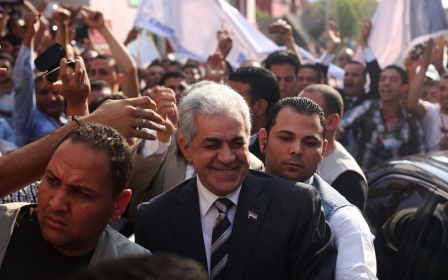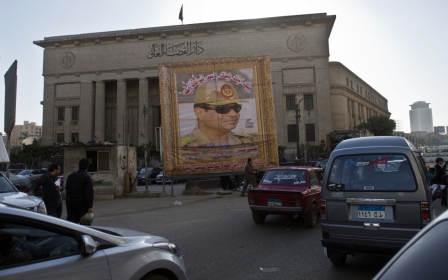Sisi declared Egyptian president with 96.9 percent of vote

Ex-army chief Abdel Fattah al-Sisi won 96.9 percent of votes in Egypt's presidential election, the electoral commission announced Tuesday, almost a year after he overthrew elected Islamist leader Mohamed Morsi.
Turnout in last week's election, hastily extended to three days amid fears of a low turnout, was 47.45 percent, said commission chief Anwar Rashad al-Asi.
Sisi rival Hamdeen Sabbahi won just three percent of the vote, excluding spoiled ballots.
Crowds in Cairo's Tahrir Square celebrated the news on Tuesday night:
There had been fears within the interim government and in the Sisi camp that the turnout for the election would be too low to give any credibility to the new government.
Mixed Reactions
Saudi Arabia's King Abdullah hailed it as a "historic day" calling for a donors conference to help Egypt through its economic troubles.
The king, whose country is a strong ally of Egypt, said Sisi's sweeping win represents a "historic day and a new stage for Egypt," in a telegram published by SPA state news agency.
"To the brothers and friends of Egypt... I invite all to a donors conference... to help it overcome its economic crisis," he said.
Maha Azzam, chair of Egyptians for Democracy UK, a non-partisan alliance of Egyptians who oppose the 3 July coup and any military involvement in politics, told Middle East Eye on Tuesday that Sisi is following a tried and tested method.
"I think the international community knows this is not a democratic political order," Azzam said. "He has tried to legitimise his regime and his personal regime through elections as dictators have always done not just in the Middle East but everywhere.”
"The international community needs to keep a close eye on what’s happening in Egypt and essentially not recognise this regime or normalise relations with it," she added.
Azzam does not believe that Sisi will be able to fulfill his promise of stability to the Egyptian people. "What we’ve seen over the last 10 months is an increasing lack of security and stability in Egypt," she told MEE. "We have a low level insurgency in the country that’s spilled over from the Sinai, we’ve seen repressive measures in order to contain opposition.
"It’s a very high price to pay for stability and what he’s going to achieve is the radicalisation of the opposition.”
In spite of his seemingly landmark victory, Azzam believes opposition to Sisi's government, from Islamists and secularists, will only increase, particularly as Egyptians across the political spectrum close ranks.
“I think there is a strong element of liberal and secular forces, even those who came out on 30 June, who didn’t want and still don’t want, a military regime and I don’t think that’s what he bargained for and he thinks that he can quash them," she said.
Egyptian journalist Abdallah Homouda says Sisi’s victory gave the people what they wanted. “I think his success was a foregone conclusion,” he told MEE. “People saw him as the man who was in the right place at the right time and took the right decision, according to their wishes, of ousting the Muslim Brotherhood.”
Homouda says that the lower than expected turnout partly stemmed from a public feeling that Sisi’s victory was assured. “Because there was no competition, people felt lax and unenthusiastic because they felt their man was going to win anyway.” He also suggests a large number of young “liberal idealists” felt concerned that they were seeing a resurgence of the Mubarak regime.
“These people have to be dealt with in terms of a suitable political discourse to win them back.”
Homouda says Sisi’s legitimacy will be consolidated when he works on job creation, housing and “improving the conditions of the poor as well as looking at the cases of people who were arrested arbitrarily during his transitional period”.
“I think these are some of the challenges which face the president and if he acts on this the proper way, that will consolidate his position and give him time to carry out his programme.”
Homouda says he is optimistic about Sisi’s plans for the country.
“He has been working on a housing programme, funded by the UAE to build 1 million housing units,” he told MEE. “He is studying the minimum wage law to increase the minimum wage to affordable living. He is working to create urban settlements outside the valley and the delta which are the traditionally inhabited regions of Egypt, development of the Sinai and co-opted the people of the Sinai as equal citizens. All this will help him a great deal.”
For Homouda, it is unlikely that the Brotherhood will be able to return in strength.
“The mobilisation of the Muslim Brotherhood and their supporters has been on the wane in the last few months,” he told MEE.
“Their main aim was to disrupt the elections so there could be no election on the record other than the one that brought Morsi to office.”
He told MEE that the Brotherhood has failed to realise the real wants and needs of the Egyptian people.
“Political Islam has to take the Egyptian nationality to heart, rather than using Islam as an identity. This goes in line with the attitude of ordinary Egyptians.”
Sisi’s victory has already provoked protests.
Four people were killed late Friday when security forces dispersed a rally staged by supporters of Morsi in eastern Cairo, a source in the pro-Morsi National Alliance for the Defense of Legitimacy told Anadolu Agency.
The four, including two women, were killed when policemen used live bullets to disperse the rally in Ain Shams district, the source said.
Sisi, who retired from the army to run for office, becomes Egypt's fifth president from the military, reasserting the institution's grip on politics in the Arab world's most populous nation.
Since army officers toppled the monarchy in 1952, the military has formed the backbone of political life in Egypt, providing the country's leaders ever since.
The only exception was Morsi, elected a year after the fall of former air force commander Mubarak.
For Mohamed Soudan, Foreign Relations Secretary of the Freedom and Justice Party - the political wing of the Muslim Brotherhood - there can be no quarter with Sisi.
“We consider him the leader of a military coup,” he told MEE. “We will never consider him a legitimate president. Our legitimate president is our behind bars.”
“Nothing will change from us towards him and his military regime as well.”
In spite of Sisi’s electoral victory, Soudan says that the Brotherhood will continue their protests.
“We will never stop our peaceful struggle, either in the sit-in or demonstrations in the street, nothing will be changed,” he told MEE.
“Maybe we will change some tactics, maybe we will work on civil disobedience, but we will never stop.”
Soudan says that he does not trust Sisi to safeguard Egypt.
“When Sisi talks, he looks like he understands nothing. He has never been an expert with the political or economical. He knows nothing about Egypt, he knows nothing about what's going on on the ground. He has no expertise on how to run a civilian country.”
Soudan told MEE that Sisi ran Egypt like a “military camp” and that he had no idea “how to run a democratic country and a civilian country.”
“People hate to come back to a military regime and he doesn’t understand that,” he told MEE. “He tries to scare people. We have more than 40,000 people behind bars now.”
“We are not looking at a good future in Egypt under military regime rule.”
New MEE newsletter: Jerusalem Dispatch
Sign up to get the latest insights and analysis on Israel-Palestine, alongside Turkey Unpacked and other MEE newsletters
Middle East Eye delivers independent and unrivalled coverage and analysis of the Middle East, North Africa and beyond. To learn more about republishing this content and the associated fees, please fill out this form. More about MEE can be found here.




